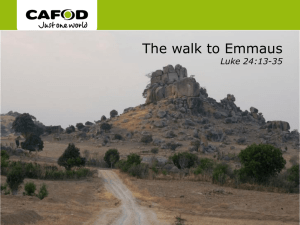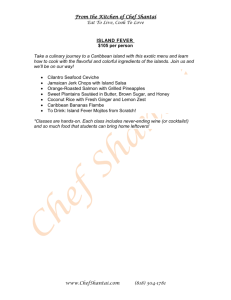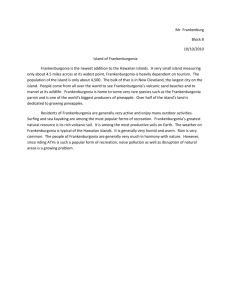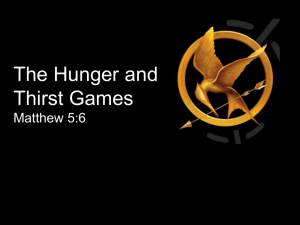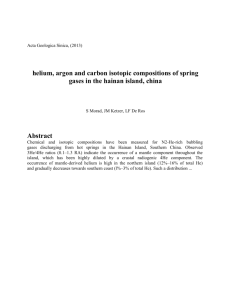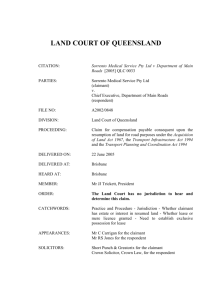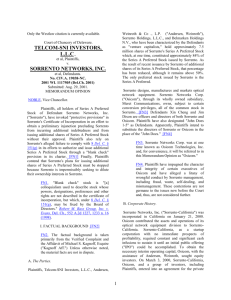Sermon - The Primate`s World Relief and Development Fund
advertisement
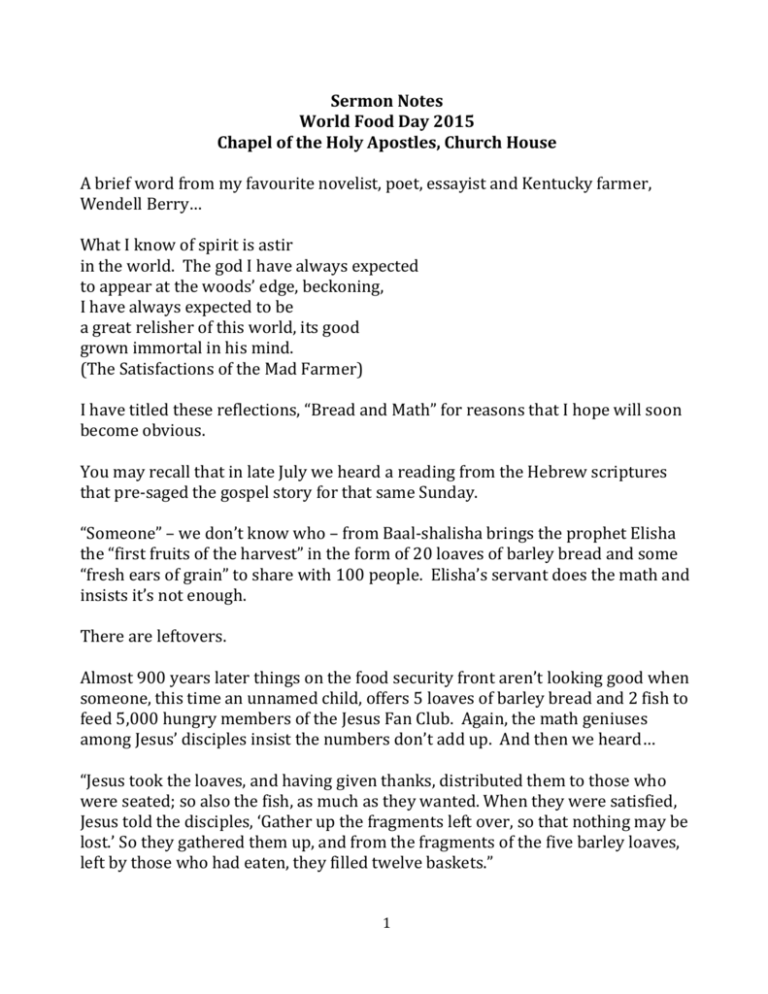
Sermon Notes World Food Day 2015 Chapel of the Holy Apostles, Church House A brief word from my favourite novelist, poet, essayist and Kentucky farmer, Wendell Berry… What I know of spirit is astir in the world. The god I have always expected to appear at the woods’ edge, beckoning, I have always expected to be a great relisher of this world, its good grown immortal in his mind. (The Satisfactions of the Mad Farmer) I have titled these reflections, “Bread and Math” for reasons that I hope will soon become obvious. You may recall that in late July we heard a reading from the Hebrew scriptures that pre-saged the gospel story for that same Sunday. “Someone” – we don’t know who – from Baal-shalisha brings the prophet Elisha the “first fruits of the harvest” in the form of 20 loaves of barley bread and some “fresh ears of grain” to share with 100 people. Elisha’s servant does the math and insists it’s not enough. There are leftovers. Almost 900 years later things on the food security front aren’t looking good when someone, this time an unnamed child, offers 5 loaves of barley bread and 2 fish to feed 5,000 hungry members of the Jesus Fan Club. Again, the math geniuses among Jesus’ disciples insist the numbers don’t add up. And then we heard… “Jesus took the loaves, and having given thanks, distributed them to those who were seated; so also the fish, as much as they wanted. When they were satisfied, Jesus told the disciples, ‘Gather up the fragments left over, so that nothing may be lost.’ So they gathered them up, and from the fragments of the five barley loaves, left by those who had eaten, they filled twelve baskets.” 1 In other words, there are leftovers. I am the first to acknowledge that the math I learned over 40 years ago, bears no resemblance to the “new” math that my son, Robin is learning in grade six. I can hardly wait ‘til we get to the “new” algebra – NOT! So I am quite prepared to accept that God’s math is also way beyond my understanding. How is it that such abundance can emerge out of what seems to be such scarcity? It is an established fact that there is enough food in the world today to feed everyone – with leftovers. Yet about 800 million people – that’s about 1 in 9 – will go to bed hungry tonight. There are all sorts of reasons – political, economic, environmental – for that math, some of which I like to think I understand; others of which are beyond my comprehension. For the past two years I’ve been privileged to learn from some of those who are trying to change that math. Together with my colleague, Sheilagh McGlynn, I’ve been working to develop educational processes and resources for PWRDF’s threeyear food security campaign. That work has come to be called “Sharing Bread,” a name coined from Jean Vanier’s 1998 Massey Lectures: “The word ‘accompaniment,’ like the word ‘companion,’ comes from the Latin words cum pane, which mean ‘with bread.’ It implies sharing together, eating together, encouraging each other to continue the journey of growth and the struggle for liberation…” Last summer and again this past July, Sheilagh and I gathered with members of our volunteer networks, interested Anglicans and overseas development partners at the Sorrento Centre on the shores of Shuswap Lake in central British Columbia for a week-long exploration of food and food security in our lives, our communities, in Canada and globally. In March, we took a delegation of our volunteers to visit our Cuban development partners who had joined us at Sorrento last summer to look at the ways in which the Cuban churches are responding to the food security needs of their communities and country. And next summer we hope to visit the Tanzanian partners who joined us at Sorrento in early July. I want to share a few, brief stories to illustrate the food security work that PWRDF has accompanied for many years and is learning about – and being enriched by – through this educational and fundraising campaign. But let me begin here in Canada where stories and experiences of addressing food security 2 abound: At Sorrento we were joined by Candace Aitkens, a lay leader in the parish of All Saints on the Magdalen Islands, tiny specks of land off Québec’s Gaspé Peninsula. Candace lives on the 2 km square patch of land called Entry Island that is a short ferry ride off the southwest end of the main island. It is one of two Anglophone communities on the Magdalens. There are 62 people resident on that island. The last two children left the island at the end of the past school year. In her early 40s, Candace is now one of the island’s youngest residents. Entry Island is a dying community that will, in all likelihood be gone within the next 15 years. Two years ago, with the support of the islands’ young Anglican priest, Jeffrey Metcalfe, All Saints applied to the Anglican Foundation for “seed” money to start a parish garden. You see, Jeffrey and Candace had done the math. Sitting around people’s kitchen tables it was clear that averting the community’s demise was not possible. And there was a lot of anger and depression among Entry islanders about that. But those conversations also revealed that Entry Island was fertile and that in years past, it had actually produced enough food to supply the main island. All that had disappeared with the commercial fishery, Employment Insurance, a monetized economy, and the loss of a sense of community. So the question became, how to “live well” as a community for the next 15 years. A parish garden seemed like a good place to start. Candace described how the garden, now in its second year, along with bee keeping, is bringing the community together in small but important ways. Children come back from the main island for planting and harvesting days. The one remaining farmer on the island has provided equipment and support. The elderly who cannot participate are offered produce from the garden none-the-less. This year fruit trees were planted. There is abundance, not scarcity. New math. We were also fortunate this summer at Sorrento to be joined for a day by Bishop Mark MacDonald. He was also leading a course that week and so our two groups came together to explore issues of food security in Indigenous communities in North America. Bishop Mark drew on his long years of experience living among the Navajo of the U.S. Southwest and the Inupiat and Inuit of Alaska, as well as his years as National Indigenous Anglican Bishop. 3 As you know, Bishop Mark is a great storyteller: “I have a friend,” he said, “who is a Presbyterian pastor in Barrow, Alaska where there has been a battle over subsistence rights. She said, “I’m so tired of translating… when we talk about ‘subsistence’ white people just don’t get it. In English subsistence is ‘just getting by.’ In Inupiat ‘the animal gives itself to you, you are thankful and IT is abundance.’” So subsistence = abundance. New math, or perhaps better said, ancient math. Geoffrey Monjesa is the development coordinator for the Anglican Diocese of Masasi, in southeastern Tanzania. PWRDF has been in partnership with the Diocese of Masasi since the mid-1980s. Geoffrey also joined us in Sorrento, together with Joyce Mtauka, a farmer and community leader who has been a beneficiary of the diocese’s food security program. As part of a five-year “Preventive Health and Food Security” project funded by PWRDF and by the Canadian Department of Foreign Affairs, Trade and Development (DFATD), the program seeks to both diversify and increase farmers’ yields through seed production and certification. 20% of farmers’ crops are donated to their village’s seed banks for distribution the following year to other farmers in the community. Those farmers, half of whom are women, are in turn required to do the same with the number of those benefitting each year tripling: from 1,155 in the first year to over 90,000 by the fifth year of the program! New math, new abundance, food security. Joyce knows everything there is to know about cultivating cashew nuts – among numerous other crops and livestock – and shared her cashew nut harvest with us. Best cashews I’ve ever tasted! Together with the rest of our group she visited the Sorrento Centre Farm where Farmer Dave Wides spoke to us about the place of this market garden in the larger Sorrento community, shared his perspectives on faith-based farming and reflected on “finding God in the garden.” Joyce took notes – lots of them – and took home to Tanzania kale and beet seeds; crops not grown there, but which we might see growing in her garden when we make a hoped-for return visit to the Diocese of Masasi next summer. There are so many stories to share, but I will conclude with the words that Bishop Mark concluded his presentation to us: “The night before Jesus died he gathered his people together and talked about food security. It was and is a simple yet complex teaching. He received the bread and a cup of wine, gave the blessing, broke the bread and shared it. In Genesis we have the story of how humans 4 abused food and then tried to hide from God. In Jesus’ teaching we learn how to eat our way into heaven. This is also an Indigenous way of understanding that our lives have everything to do with receiving, blessing, breaking and sharing; the four directions. Treating your food as a sacred thing is what Jesus was talking about… It’s holy communion. It’s the food security act of our faith!” As we gather at the communion table, may we share (barley) bread, cum pane… And my math suggests there will be leftovers! Amen. 5
